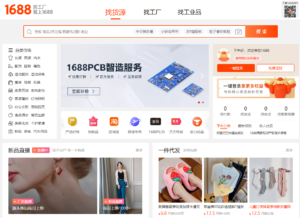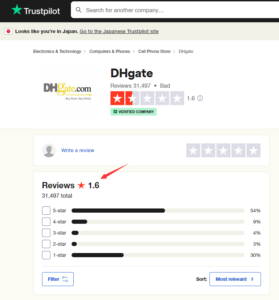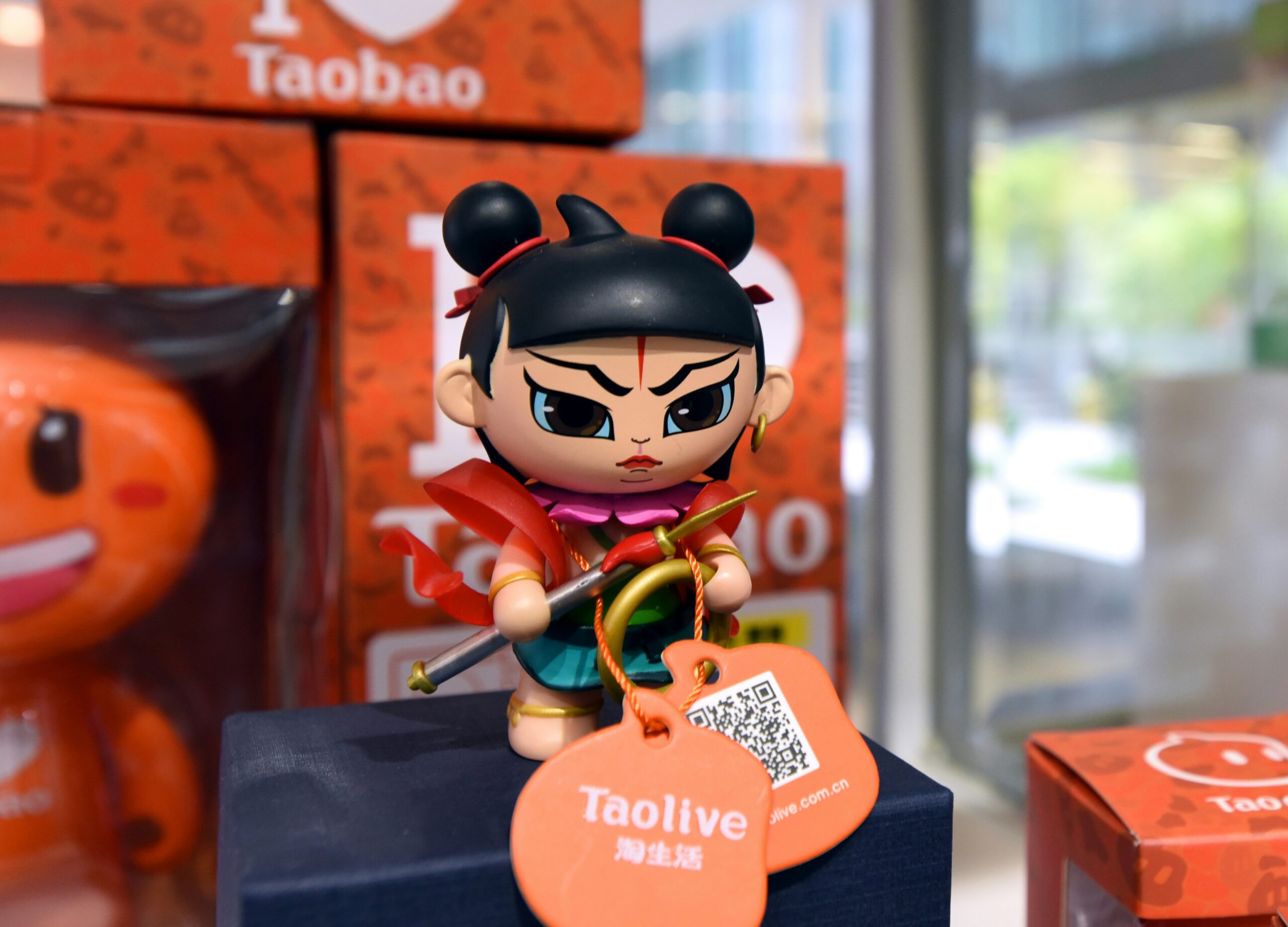
Understanding Alibaba
Alibaba is a global e-commerce platform that connects buyers and sellers from around the world. Established by Jack Ma in 1999, this online marketplace now facilitates millions of transactions every day across an extensive selection of electronics, clothing, machinery and raw materials products.
Alibaba stands out among other platforms due to its ability to connect buyers with suppliers located in China – known for their manufacturing abilities and competitive prices – making it an attractive option for businesses searching for lower cost product sources.
As with any popular platform, popularity brings with it an increase in scams and fraudulent sellers, necessitating buyers to exercise caution and take precautionary steps in order to ensure safe transactions. We will provide tips and strategies in this guide that can assist buyers navigate this platform and identify trustworthy suppliers.
Alibaba vs AliExpress
Many people often mistake Alibaba and AliExpress, two popular online marketplaces owned by the Alibaba Group, as one another; although each serves distinct functions.
Alibaba provides an effective B2B marketplace, connecting businesses and suppliers. Alibaba caters specifically to bulk purchases and wholesale deals – ideal for retailers, resellers and businesses searching for products in bulk amounts.
AliExpress, on the other hand, is a business-to-consumer (B2C) platform that enables individuals and small businesses to purchase directly from suppliers. It specializes in fulfilling smaller orders more suitable for individuals or small businesses looking for smaller quantities.
When it comes to dropshipping, both Alibaba and AliExpress can be viable options; the decision ultimately rests with your business needs and preferences. We will explore each platform’s pros and cons in detail so that you can make an informed decision.
Is Alibaba Legit?
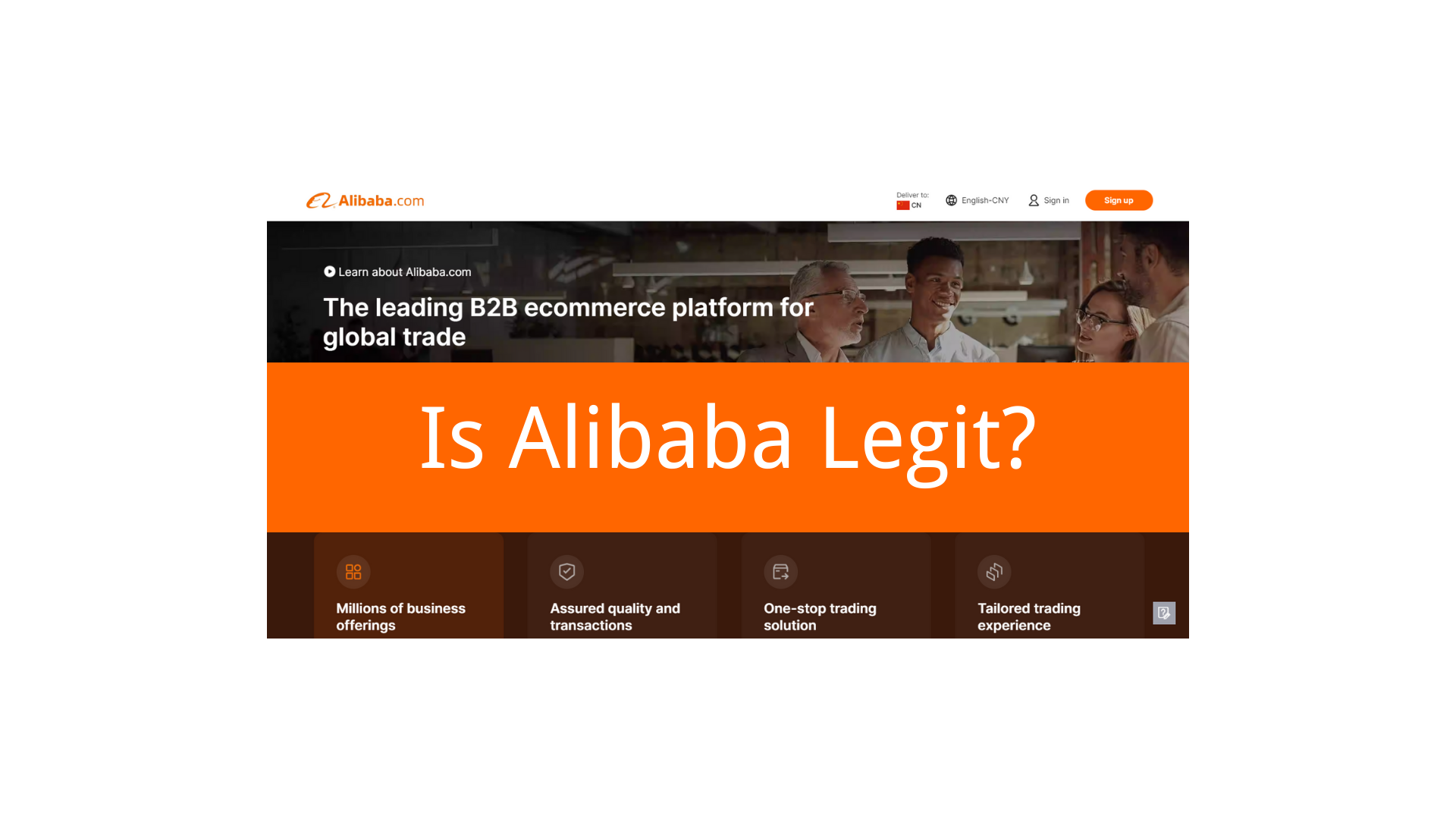
One of the most common asked questions about Alibaba is whether or not it’s legitimate platform. While Alibaba is legal and safe to use, as with any online marketplace there can be risks involved and it is crucial that users exercise caution and take appropriate steps for an enjoyable experience.
Alibaba was established by Jack Ma in 1999 and has become one of the leading e-commerce platforms globally since. Connecting buyers and sellers from around the globe, offering products and services from all corners, it now boasts millions of registered users and an impeccable track record in international trade facilitation. Alibaba stands as an authoritative platform.
However, it’s essential to remember that not all sellers on Alibaba can be trusted – as with any online marketplace, there may be unscrupulous individuals or companies out to take advantage of unwary customers. Therefore, it is wise to conduct thorough research prior to making any purchases on Alibaba.
One key step toward having an enjoyable shopping experience on Alibaba is conducting thorough due diligence on any seller you intend to buy from. Research their ratings and reviews as well as any red flags such as negative feedback or customer complaints from previous customers, then verifying contact info and credentials of sellers before proceeding with purchases.
Payment security should also be carefully considered when shopping on Alibaba, with various payment methods such as credit cards, bank transfers and its own platform Alipay available. Secure payments such as credit cards or escrow services offer buyer protection features that allow for dispute charges or refund requests in case anything goes amiss with your purchase.
Communication is key when dealing with sellers on Alibaba. Reach out and ask any queries before making your purchase decision; legitimate sellers will respond quickly with answers; be wary of sellers who do not answer or are unwilling to provide information as you request it.
Finally, when setting expectations when using Alibaba it’s essential to set realistic ones. While Alibaba may provide an extensive selection of products at highly competitive prices, international trade is not without its challenges: shipping times may take longer and additional expenses such as customs fees or import taxes may arise – by being aware of this factor and planning ahead, disappointment can be avoided and your experience more pleasant.
At Alibaba, it is clear that conducting business can be done legally and ethically. But to have an enjoyable and successful experience on Alibaba it’s vitally important that buyers proceed with caution by conducting proper research, using secure payment methods, communicating effectively, setting realistic expectations, etc.
How Does Alibaba Work?
Alibaba works as a middleman between buyers and sellers. Here’s a step-by-step breakdown of how the platform operates:
- Product Search: Buyers search for products they are interested in using keywords or categories on Alibaba.com. The platform provides a user-friendly search interface that allows buyers to filter their search results based on various criteria such as price range, location, and supplier ratings.
- Supplier Selection: Buyers evaluate different suppliers based on their product offerings, prices, minimum order quantities (MOQs), and other factors. Alibaba provides detailed supplier profiles that include information about the supplier’s company background, product range, production capacity, and certifications. This helps buyers make informed decisions and choose reliable suppliers.
- Communication: Buyers can communicate with suppliers through Alibaba’s messaging system to clarify any questions or negotiate terms. The messaging system allows for real-time communication and provides a convenient platform for buyers and suppliers to discuss product specifications, pricing, shipping options, and any other details related to the transaction.
- Order Placement: Once the buyer is satisfied with a supplier, they can place an order through Alibaba’s secure payment system. The platform offers a seamless order placement process, where buyers can specify the quantity, select any customization options, and provide shipping details. Buyers can also track the progress of their orders and receive notifications at each stage of the process.
- Payment: Alibaba offers various payment methods, including credit cards, bank transfers, and its own payment platform, Alipay. Alipay is a widely used digital payment system that provides secure and convenient transactions. It offers buyer protection by holding the payment in escrow until the buyer confirms the receipt of the goods in satisfactory condition.
- Product Shipment: Suppliers ship the products to the buyer’s specified location. It’s crucial to discuss shipping terms and delivery times with the supplier beforehand. Alibaba provides a tracking system that allows buyers to monitor the shipment status and estimated delivery date. In case of any issues or delays, buyers can contact the supplier directly or seek assistance from Alibaba’s customer support team.
- Product Inspection: Upon receiving the products, buyers can inspect them to ensure they meet the expected quality and specifications. Alibaba encourages buyers to conduct thorough inspections and provides guidelines on how to handle disputes in case of any discrepancies. This ensures that buyers receive the products they ordered and helps maintain trust and transparency in the platform.
- Feedback and Reviews: Buyers can leave feedback and reviews about their experience with the supplier, helping other buyers make informed decisions. Alibaba values the opinions of its users and actively encourages the sharing of feedback. The platform has a rating and review system that allows buyers to rate suppliers based on various factors such as product quality, communication, and delivery time. This helps build a community of trust and accountability among buyers and suppliers on Alibaba.
How to Avoid Alibaba Scams
While Alibaba is a legitimate platform, there are scammers who try to take advantage of unsuspecting buyers. Here are some tips to help you avoid Alibaba scams:
- Research the Supplier: Before engaging with a supplier, it is crucial to conduct thorough research. Start by checking their company profile on Alibaba. Look for essential information such as their business license, contact details, and location. Take note of their ratings and reviews from other buyers on the platform. Pay attention to any red flags, such as negative feedback or suspiciously low prices. Additionally, consider the number of years the supplier has been on Alibaba. A longer track record can indicate a more reliable supplier.
- Communicate Outside Alibaba: Scammers may try to communicate with you outside of Alibaba’s messaging system to avoid detection. Always communicate within the platform to maintain the necessary safeguards. Alibaba’s messaging system provides a secure environment where you can keep track of conversations and report any suspicious activity.
- Secure Payment: When it comes to making payments on Alibaba, it is essential to prioritize security. Alibaba offers its secure payment system called “Alibaba Secure Payment” or “Alibaba Trade Assurance.” These systems provide protection to buyers by holding funds in escrow until the buyer confirms the satisfactory receipt of the goods. If a supplier insists on only accepting bank transfers or other untraceable methods, it may be a sign of a scam. Opt for payment methods that offer buyer protection, such as credit cards or PayPal, whenever possible.
- Request Samples: Before placing a large order, it is wise to request samples from the supplier. This step allows you to assess the quality of the products and verify if they meet your expectations. Legitimate suppliers should be willing to provide samples for a reasonable fee. Be cautious if a supplier refuses to provide samples or charges exorbitant fees.
- Verify Certifications: If a supplier claims to have certain certifications or licenses, it is essential to ask for proof and verify their authenticity. This is especially important for products that require specific certifications, such as electronics or medical devices. You can request copies of the certifications and cross-check them with the relevant authorities or certification bodies. Additionally, you can inquire about the supplier’s manufacturing processes and quality control measures to ensure compliance with industry standards.
- Use Trade Assurance: Alibaba’s Trade Assurance program provides additional protection for buyers. It is a free service that safeguards your orders and payments. When you place an order through Trade Assurance, your payment is held in escrow until you confirm the receipt of the goods. If any issues arise, such as non-delivery or product discrepancies, you can file a dispute and be eligible for refunds or replacements. Look for suppliers who offer Trade Assurance to mitigate the risk of scams.
By following these tips and exercising caution, you can minimize the risk of falling victim to scams on Alibaba. Remember to trust your instincts and be wary of deals that seem too good to be true. With proper research, communication, and secure payment methods, you can confidently navigate the Alibaba platform and find reliable suppliers for your business needs.
Finding a Safe Supplier from Alibaba
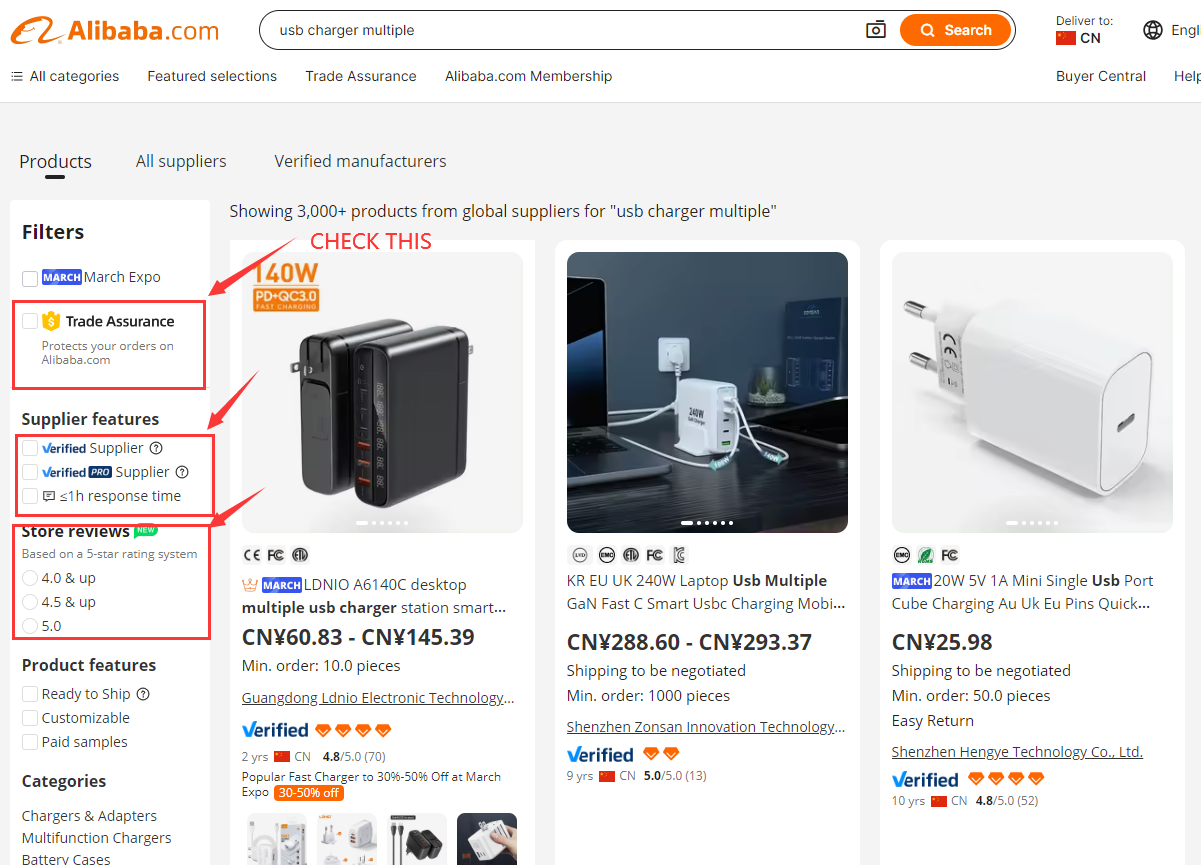
Finding a safe and reliable supplier on Alibaba is crucial for a successful business relationship. Here are some tips to help you find a trustworthy supplier:
- Gold Supplier: Look for suppliers who are designated as “Gold Suppliers” on Alibaba. These suppliers have undergone a verification process and are more likely to be legitimate. Gold Suppliers are known for their credibility and trustworthiness, as they have met certain criteria set by Alibaba. This designation provides a level of assurance that the supplier is reliable and has a proven track record of delivering quality products.
- Verified Supplier: In addition to Gold Suppliers, Alibaba also verifies certain suppliers, indicating that they have passed specific requirements. These verified suppliers have gone through a more rigorous screening process, which includes verifying their business license, company registration information, and manufacturing capabilities. Choosing a verified supplier adds an extra layer of confidence, as Alibaba has independently verified their credentials.
- Company Profile: When evaluating potential suppliers, it is essential to carefully review their company profile. Look for established companies with a history on Alibaba and positive customer feedback. A well-established supplier with a strong reputation is more likely to provide reliable products and services. Take note of the supplier’s years of experience, their production capacity, and any certifications they hold. This information can give you a better understanding of the supplier’s capabilities and expertise.
- Response Time: Pay attention to the supplier’s response time. A prompt and attentive supplier is more likely to be reliable and committed to providing good customer service. Quick responses to inquiries and clear communication are indicators of a supplier’s professionalism and dedication. On Alibaba, you can see the average response time of a supplier, which can give you an idea of their level of responsiveness.
- Trade Assurance: As mentioned earlier, consider suppliers who offer Alibaba’s Trade Assurance. This program adds an extra layer of protection for buyers. With Trade Assurance, Alibaba acts as a mediator in case of any disputes or issues between the buyer and the supplier. This service provides financial security and ensures that your funds are protected until you are satisfied with the received products. Suppliers who offer Trade Assurance demonstrate their commitment to customer satisfaction and are more likely to be reliable.
- Ask for References: Don’t hesitate to ask suppliers for references from past customers. Contact those customers to inquire about their experience working with the supplier. This step allows you to gather first-hand information about the supplier’s reliability, product quality, and overall customer service. Speaking with previous clients can provide valuable insights and help you make an informed decision.
By following these tips and conducting thorough research, you can find a safe and reliable supplier on Alibaba. Remember to exercise due diligence, ask questions, and carefully evaluate each potential supplier before making a final decision. Building a strong and trustworthy relationship with your supplier is essential for the success of your business.
Dropshipping from Alibaba: Finding a Reliable Dropshipper
If you’re interested in dropshipping, Alibaba can be a valuable resource for finding reliable dropshippers. Here are some tips to help you find a trustworthy dropshipper:
- Dropshipping Experience: Look for suppliers who specifically mention dropshipping in their product descriptions or company profiles. They are more likely to understand the requirements and processes involved. This experience can make a significant difference in the efficiency and reliability of the dropshipper. They will be familiar with the challenges and intricacies of dropshipping, such as handling inventory, managing order fulfillment, and providing excellent customer service.
- Product Range: Assess the supplier’s product range. A reliable dropshipper should offer a wide variety of products to cater to different niches and customer preferences. This diversity allows you to find products that align with your target market and business goals. Additionally, a dropshipper with a diverse product range demonstrates their ability to source products from multiple manufacturers, increasing the chances of finding unique and in-demand items for your customers.
- Shipping Options: Check the available shipping options and delivery times offered by the dropshipper. Fast and reliable shipping is crucial for customer satisfaction. Look for dropshippers who offer multiple shipping methods to cater to different customer preferences. Additionally, consider their shipping times and whether they align with your customers’ expectations. Timely delivery is essential to maintain a positive reputation and encourage repeat purchases.
- Communication: Engage in communication with the dropshipper to assess their responsiveness and willingness to address your concerns. Clear communication is vital for a successful dropshipping partnership. Look for dropshippers who respond promptly, provide detailed information, and are transparent about their processes. Effective communication ensures that you can quickly resolve any issues that may arise, such as order discrepancies, product inquiries, or shipping delays.
- Product Quality: Request samples from the dropshipper to evaluate the quality of their products. Providing high-quality products to your customers is essential for the success of your dropshipping business. Inspect the samples thoroughly, checking for any defects or inconsistencies. Assess the materials used, craftsmanship, and overall durability. By ensuring the products meet your standards, you can confidently offer them to your customers, building trust and loyalty.
- Dropshipping Policies: Familiarize yourself with the dropshipper’s policies, such as return and refund policies. Ensure they align with your business requirements and customer expectations. Review their policies regarding damaged or defective items, returns due to customer dissatisfaction, or incorrect shipments. Understanding these policies beforehand will help you handle any potential issues efficiently and maintain a positive customer experience.
What’s the Difference Between Alibaba and AliExpress?
Alibaba and AliExpress are both owned by the Alibaba Group, but they cater to different types of buyers and sellers.
Alibaba:
Alibaba.com primarily targets businesses looking to source products in bulk. It connects buyers with manufacturers, wholesalers, and suppliers who offer competitive prices for large quantity orders. Alibaba is ideal for entrepreneurs, retailers, and e-commerce store owners who want to stock inventory and manage their own shipping and fulfillment processes.
When using Alibaba, buyers have access to a vast network of suppliers from various industries, including electronics, fashion, home goods, and more. The platform provides advanced search filters, allowing users to narrow down their options based on specific criteria such as price range, location, and product specifications.
Additionally, Alibaba offers a range of services to facilitate secure transactions and build trust between buyers and sellers. These services include Trade Assurance, which protects buyers’ payments and ensures that the ordered products meet the agreed-upon quality standards.
AliExpress:
AliExpress, on the other hand, is designed for individual consumers and small businesses looking to buy products in smaller quantities. It offers a wide range of products at competitive prices, often with free or low-cost shipping options. AliExpress is popular among dropshippers who don’t want to hold inventory and prefer to have products shipped directly to their customers.
Unlike Alibaba, AliExpress allows buyers to make purchases without minimum order quantities. This makes it convenient for individuals who want to buy a single item or small quantities of products for personal use. The platform features a user-friendly interface and supports multiple languages, making it accessible to a global customer base.
AliExpress also offers buyer protection services such as a refund policy and dispute resolution process. If a buyer encounters any issues with their purchase, they can request a refund or open a dispute to resolve the problem.
In summary, Alibaba is more suitable for bulk purchasing and business-to-business transactions, while AliExpress is geared towards individual consumers and small-scale entrepreneurs. Both platforms provide a wide range of products and services, but their target audiences and functionalities differ to accommodate different buyer needs.
When deciding between Alibaba and AliExpress for dropshipping, it’s important to consider your specific business needs and preferences. One factor to consider is the quantity of products you plan to sell. If you’re looking to sell products in larger quantities, Alibaba is the better option. This is because on Alibaba, you have the ability to negotiate lower prices and have more control over the branding and packaging of the products.
On the other hand, if you’re looking for a wider variety of products to sell, AliExpress may be the better choice. AliExpress offers a vast range of products, making it easier to find niche items to sell. It caters to individual consumers, so you can find unique and trendy products that may not be available in bulk on Alibaba.
Another factor to consider is inventory management. With Alibaba, you have more control over inventory management as you can stock products in your own warehouse. This allows you to have a more hands-on approach and ensures that you have control over the availability of products. On the other hand, AliExpress allows for a more hands-off approach as products can be shipped directly to your customers. This can be convenient if you don’t want to deal with the hassle of managing inventory.
Shipping times are also an important consideration. Generally, AliExpress offers faster shipping times compared to Alibaba. This is important if you want to provide quick delivery to your customers and ensure a positive shopping experience.
Building relationships with suppliers is another factor to consider. On Alibaba, you have the advantage of being able to negotiate directly with manufacturers and wholesalers. This allows you to build relationships and potentially negotiate better terms. AliExpress, being a retail marketplace, may have less room for negotiation.
Ultimately, the choice between Alibaba and AliExpress depends on your business model, product requirements, and personal preferences. Some dropshippers even use a combination of both platforms to take advantage of their respective strengths. It’s important to carefully evaluate the pros and cons of each platform and choose the one that aligns with your business goals and objectives.
Why is Shipping from Alibaba So Expensive?
Shipping costs from Alibaba can sometimes be higher compared to other platforms or local suppliers. Several factors contribute to the relatively higher shipping expenses:
- International Shipping: Most suppliers on Alibaba are based in China, which means products need to be shipped internationally. International shipping costs, especially for larger and heavier items, can be higher due to customs fees, fuel surcharges, and other logistical expenses.
- Shipping Methods: The shipping method you choose can significantly impact the cost. Faster shipping options like express couriers (e.g., DHL, FedEx) tend to be more expensive than slower methods like sea freight or standard air mail.
- Product Size and Weight: Larger and heavier products require more packaging materials and may occupy more space during shipping, leading to increased costs.
- Customs and Duties: Depending on your country’s import regulations, you may be subject to customs duties and taxes when importing products from Alibaba. These additional charges can contribute to the overall cost.
- Shipping Distance: The distance between the supplier’s location and your destination can affect shipping costs. Longer distances generally result in higher shipping expenses.
- Shipping Volume: Another factor that can affect shipping costs is the volume of products being shipped. Suppliers often offer discounts for larger orders, as shipping costs can be spread across multiple items.
- Shipping Insurance: Some suppliers may include shipping insurance in the overall cost, which provides coverage in case of loss or damage during transit. This additional protection can increase the shipping expenses.
It’s important to consider shipping costs when calculating your product pricing and profit margins. You can mitigate the impact of expensive shipping by negotiating with suppliers, exploring alternative shipping methods, or optimizing your product selection to focus on items with lower shipping costs. Additionally, it’s crucial to factor in any potential customs duties and taxes that may be applicable to ensure accurate cost estimation. By carefully analyzing and managing shipping expenses, you can make informed decisions and maintain a competitive edge in the global marketplace.


